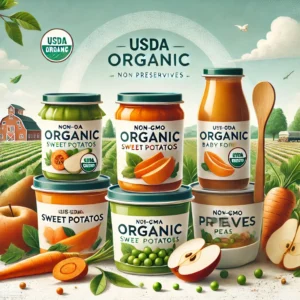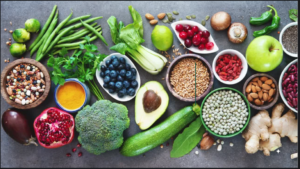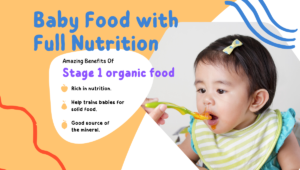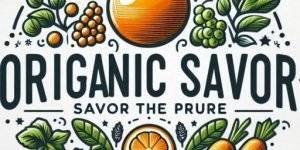
Understanding these benefits is crucial for health-conscious consumers, sustainable living advocates, eco-friendly individuals, organic food enthusiasts, and environmental advocates. Here’s an in-depth look at why organic food is good for us, highlighting key health benefits and the positive impact on the environment.
Some Key Health Benefits of Organic Food: Why Organic Food is Good for Us
Please keep in mind the following information:
Organic food consumption may lead to fewer residues from synthetic chemicals, potentially reducing the associated health risks.
Research suggests organic produce often contains higher levels of essential nutrients such as vitamins, minerals, and antioxidants, which are necessary for maintaining a healthy body and may contribute to preventing chronic diseases.
-
- 1: Better Tastenutrients,
Many people believe organic food tastes better than conventionally grown food. This superior taste is often attributed to farming practices prioritizing soil health and plant well-being, producing more flavorful fruits and vegetables.
-
- 2: No Genetically Modified Organisms (GMOs)
Organic standards explicitly prohibit the use of genetically modified organisms (GMOs). By choosing organic, you avoid GMOs, which are controversial due to their long-term health effects on humans.
-
- 3: Antibiotic and Hormone-Free Meat
Organic meat comes from animals raised without routine antibiotics or growth hormones. This helps minimize the development of antibiotic-resistant bacteria and potential side effects associated with hormone consumption.
-
- 4: Supports Immune System Health
Eating organic food free from artificial additives and preservatives can help support a robust immune system. The absence of synthetic chemicals allows your body to function more effectively, without the burden of processing these substances.
-
- 5: Reduces Risk of Foodborne Illnesses
Organic farming practices emphasize cleanliness and humane treatment of livestock, reducing the risk of contamination by harmful bacteria like E. coli and Salmonella. Consequently, organic food consumers may face a lower risk of food-borne illnesses.
Is it better to eat organic or inorganic? and why organic food is good for us:
Organic Foods:
-
- 1: Nutrient-Rich: Organic foods are often higher in nutrients and antioxidants than their conventional counterparts. These goodies can support overall health and well-being.
-
- 2: Fewer Pesticides: Organic produce tends to contain fewer pesticides. “This is a major advantage for people who want to reduce their chemical exposure.”
-
- 3: Taste Sensation: Many people think organic fruits and veggies taste better. Perhaps it’s the absence of synthetic chemicals or the cosmic alignment of flavor molecules – either way, yum!
Inorganic Foods (Conventional):
-
- 1: Convenience and Cost: Inorganic foods can be more convenient and cost-effective. They’re readily available in most grocery stores and often have a lower price tag.
-
- 2: Omega-3 Fatty Acids: Here’s an interesting tidbit: livestock raised through grazing (which tends to be non-organic) usually have higher levels of heart-healthy omega-3 fatty acids. So, if you’re a fan of fish oil benefits, conventional meat might be your jam.
Environmental Impact of Organic Food Production: Choosing Organic Food is Good for Us
-
- 1: Promotes Soil Health
Organic farming methods, including crop rotation, composting, and natural fertilizers, are crucial in improving soil health. Healthy soil retains more water, promotes diverse ecosystems, and enhances crop resilience.
-
- Organic farming reduces water and soil pollution by avoiding synthetic pesticides and fertilizers. This practice is essential for maintaining clean water sources and preventing harmful chemicals from entering the food chain.
Organic farmers often adopt water-saving techniques, such as drip irrigation and mulching. These methods help conserve water, making organic farming more sustainable in drought-prone areas.
-
- 2: Enhances Biodiversity
Organic farms unequivocally bolster biodiversity by establishing habitats for beneficial insects, birds, and other wildlife. By cultivating a diverse ecosystem, organic farming effectively maintains a balanced environment capable of naturally controlling pests and diseases.
-
- 3: Combats Climate Change
Organic farming practices, including reduced reliance on fossil fuels and carbon sequestration in healthy soils, contribute to climate change mitigation. Organic farms are crucial in reducing greenhouse gas emissions by effectively storing more carbon in the soil.
-
- 4: Protects Pollinators
Organic farming avoids harmful pesticides that can negatively impact pollinators like bees and butterflies. By protecting these essential creatures, organic farming ensures the continued pollination of many crops.
-
- 5: Reduces Energy Consumption
Organic farming typically requires less energy than conventional farming due to its avoidance of synthetic chemicals and emphasis on manual labor and natural processes. This lower energy demand contributes to a smaller carbon footprint.
-
- 6: Supports Sustainable Agriculture
Organic farming promotes long-term agricultural productivity by prioritizing ecological balance and sustainability. This approach ensures that future generations can continue to benefit from the land without depleting its resources.
Conclusion
Choosing organic food is not just a trend; it’s a commitment to better health and a healthier planet. From reducing exposure to harmful chemicals and providing nutrient-rich produce to supporting sustainable farming practices and protecting the environment, the benefits of organic food are numerous and compelling.
If you’re passionate about living a healthy, eco-friendly lifestyle, switching to organic food is a significant step in the right direction. Join the growing community of organic savor enthusiasts and start reaping the benefits today!







